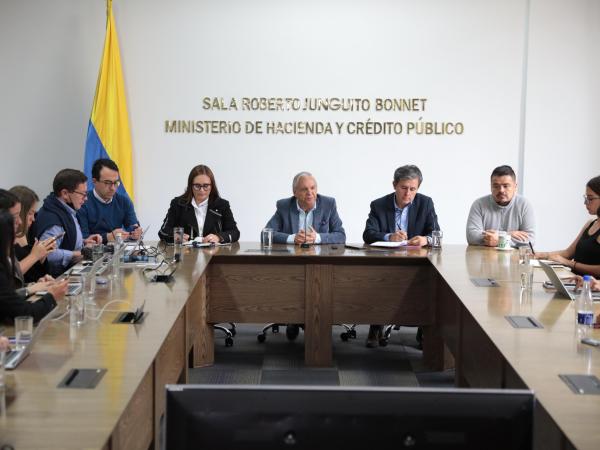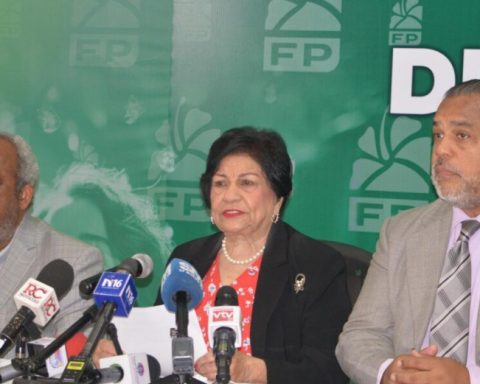Although the talks to define what the General Budget of the Nation will look like for next year have not officially begun and Congress is still studying this project, the debate on the calculations presented by the Ministry of Finance to justify these accounts has not given any respite, while the unions They are calling for moderation in the proposed spending, arguing that the slowdown requires austerity.
In just over a week, there have already been at least six reports claiming that there are ‘good numbers’ in the Budget. This is without taking into account that it depends on two bills: one to change the tax scheme and another to speed up compliance with the fiscal rule, which have not even been submitted for debate in the Legislature, where at this moment the processing times are tight.
(More information: Banks are betting on artificial intelligence to reduce cases of “box office scams”)
However, the Ministry of Finance has been optimistic and points out that The conditions can be met, as they have been working quickly to make this happen and it is all part of the recovery plan that the country needs. They also made it clear that the fiscal rule will not be changed and that investor confidence will be restored.
Pressures on the Dian
The first point to review in the Government’s accounts is the increase in revenue expectations for 2025, which comes with a significant increase in the collection goal of the Dian, an entity that is once again under great pressure, since a collection of $29 billion is expected for the concept of efficiency, which is nothing other than its management tasks, the same ones on which it is currently hanging.
Ministry of Finance and Public Credit
Private file
It is worth noting here that for the Autonomous Committee on Fiscal Rule (CARF) this is a difficult goal to achieve and only $9 billion of those $29 billion could be realistic. If this is achieved, next year’s Budget would start with a fiscal gap of $20 billion. This is without taking into account that economic growth is below expectations.
Just to give an example, experts from Banco de Bogotá presented a scenario in which they warn that “if economic growth in 2025 is more at a level of 2.6% (the scenario they expect) and not 3% as the Government expects, tax collection could be around $3 billion below the target,” which would increase the fiscal gap to $23 billion.
(You may be interested in: There is little atmosphere to revive presidential re-election, according to Senate president)
As far as CARF is concerned, this committee said that its projections The revenue forecast for next year is $51 billion below what the Ministry of Finance had planned, “of which $48 billion is due to lower tax collection (2.5% of GDP),” which must be adjusted to avoid future pressures.
According to them, this reduction is explained by a lower collection of $25 billion due to the effect of the lower collection base from 2023 and 2024, both from oil and non-oil revenues; the elimination of the projection of collection from litigation estimated at $10 billion for 2025 in the fiscal framework of 2023, a lower expectation of management by the DIAN by about $9 billion and a lower collection expected by the tax reform of 2022 due to the effect of the elimination of the non-deductibility of royalties and the lower expectation of mining and oil surcharges.

Colombian pesos
iStock
High dependency
Another aspect that raises doubts regarding the solidity of the accounts What the Petro Government is doing has to do with the fiscal gap that the Superior Council of Fiscal Policy (Confis) estimated at $24 billion for next year and that according to the Treasury technicians will be covered with a financing law of $12 billion and by advancing the compliance of the fiscal rule, a move that would free up another $12 billion in the accounts.
This means that if in the worst case scenario, as happened with the non-deductibility of royalties and with the arbitration litigation project, the aforementioned projects do not materialize, the country will be left without a way to finance the expenses (mostly investment) that it has planned for 2025.
(Read here: “We received the country with an overheated economy”: Bonilla, on Petro’s two years)
Because of this, for María Claudia Lacouture, president of Aliadas, although the budget reflects the intention to address important challenges, it is insufficient for the country’s needs in terms of productive investment, which for her is a fundamental axis in the reactivation of the economy, the promotion of growth. and the creation of formal employment, elements that he considered key to combating poverty.
“As we have mentioned from the Aliadas alliance, we recognize the fiscal fragility in which Colombia finds itself and we understand the need to adjust the national budget. However, it is vital to prioritize spending austerity in non-productive areas, focusing on reducing operating expenses, which have increased significantly between 2022 and 2024 based on unrealized growth projections,” said this expert.
(For you: Flower Fair: This was the most beautiful thing about the pet parade)
Operating expenses
A third front of the General Budget of the Nation that raises concern due to apparently ‘happy accounts’, is that of operating expenses, which contrary to what was proposed and warned by research centers and control agencies, continues to rise, pressured mainly by state subsidies and transfers.
Since 2020, when the country had to lock itself down to deal with the threat of Covid-19, to date, operating expenses (in current prices) have gone from $211.8 billion to $308.8 billion; which translates into a 46% increase in the last five years. If we add to this the proposal made by the Ministry of Finance, to allocate $327.4 billion to the operation of the State, the growth of this item would be $115.5 billion compared to five years ago, that is, an increase of 54.5%.

Economic recession
iStock
This is why Bruce Mac Master, president of Andi, calls for to be prudent in the use of spending, taking into account that these resources come out of the pockets of households and businesses in the country, which are not doing well these days due to the slowdown and the effects of two tax reforms in less than three years.
“This is a serious discussion that affects us all and on which the future of our country will depend. If we make a wrong decision in terms of budget and taxes, we will probably be leading Colombia down the path or onto the path of recession. Be very careful,” said the union spokesman.
In this way, the National Government only has one way out and that is to cut spending from the operating areas, optimizing the use of subsidies, as these analysts point out. that investment must be increased and debt commitments cannot be ignored.


















